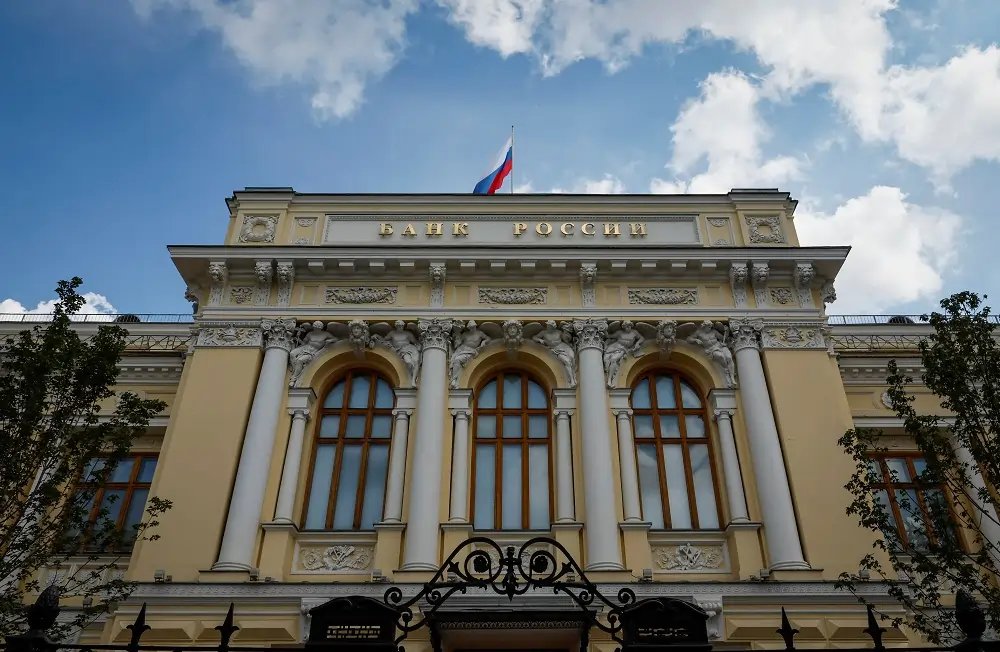Russia’s key rate seen climbing by another 200 bps to 23%: Reuters poll
Published by Jessica Weisman-Pitts
Posted on December 16, 2024
3 min readLast updated: January 28, 2026

Published by Jessica Weisman-Pitts
Posted on December 16, 2024
3 min readLast updated: January 28, 2026

By Elena Fabrichnaya
MOSCOW (Reuters) – The Russian central bank is expected to hike its key interest rate by another 200 basis points (bps) to 23% at its last rate-setting meeting of 2024 this week, according to a Reuters poll, as high inflation has been exacerbated by a weaker rouble.
Twenty-three of 27 economists in the poll expect the 200 bps hike, while two anticipate a more moderate 100 bps increase. Two others predict an even more aggressive hike of over 200 bps.
The central bank’s benchmark interest rate was last at the 23% level in 2002.
“The rate of price growth accelerated, and the rouble has shifted to a new, weaker equilibrium level of 100-plus against the dollar. This leaves the regulator with no other option but to raise the rate,” said Oleg Kuzmin from Renaissance Capital.
At the previous meeting on Oct. 25, the central bank hiked the rate by 200 basis points to 21%, the highest level since the early years of President Vladimir Putin’s rule, when Russia was recovering from the chaos following the collapse of the Soviet Union.
The move also brought the rate above the level seen during the market panic at the start of what Russia calls its special military operation in Ukraine in February 2022.
The October hike provoked an angry reaction from business leaders who complained that with such a high cost of capital, any further investment did not make economic sense.
Andrei Kostin, CEO of Russia’s second-largest lender VTB, even suggested that in the context of high military expenditures and sanctions, the key interest rate was not fully effective as a monetary policy tool.
CLOSE TO COMPLETION
Russia’s weekly data indicated that inflation shows no sign of slowing down despite the tightening and has already exceeded the central bank’s full-year estimate of 8.5%, running at 8.8%.
Economists polled by Reuters estimate 2024 full-year inflation to be between 9.3% and 10%.
The Russian rouble lost up to 15% against the dollar in November after the U.S. imposed new financial sanctions that disrupted payments for Russian energy, creating a shortage of foreign currency in the domestic market.
The rouble has since regained much of the lost ground, but volatility in the forex market persisted as markets adjusted to the sanctions. Most analysts now expect the rouble to stabilise at just above 100 to the dollar.
The central bank’s governor, Elvira Nabiullina, signalled that the regulator may start gradually cutting rates in 2025, provided there are no external shocks. Analysts said easing in the second half of 2025 was more likely.
“I would not expect a cut in the key rate in the first half of 2025. However, scenarios with the first rate cut in the third quarter of 2025 I still consider realistic,” said Dmitry Kulikov from ACRA ratings agency.
“The market believes that the monetary tightening cycle is close to completion,” Zenit Bank analysts said.
Analysts noted that a slowdown in corporate lending growth in November to the lowest month-on-month value since the start of the year also suggested that the 200 bps hike this year was sufficient.
“Such a decision will be a compromise between the accelerated current inflation rates in November and the significant slowdown in total lending,” said Rodion Latypov from VTB.
(Writing by Gleb Bryanski, editing by Ros Russell)
The key interest rate is the rate at which a central bank lends money to commercial banks, influencing overall economic activity, inflation, and currency strength.
Inflation is the rate at which the general level of prices for goods and services rises, eroding purchasing power.
A currency's equilibrium level is the exchange rate at which supply and demand for that currency are balanced, reflecting its true market value.
Basis points are a unit of measure used in finance to describe the percentage change in the value or rate of a financial instrument, where one basis point is equal to 0.01%.
Explore more articles in the Top Stories category











